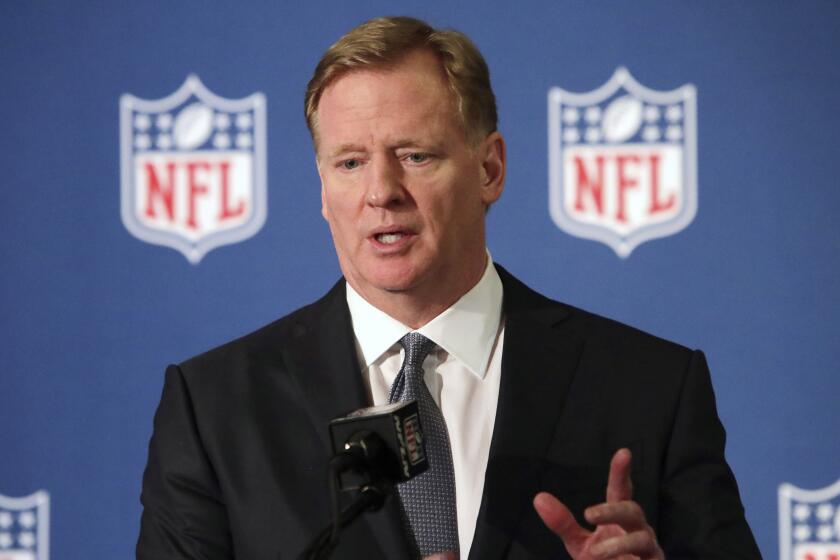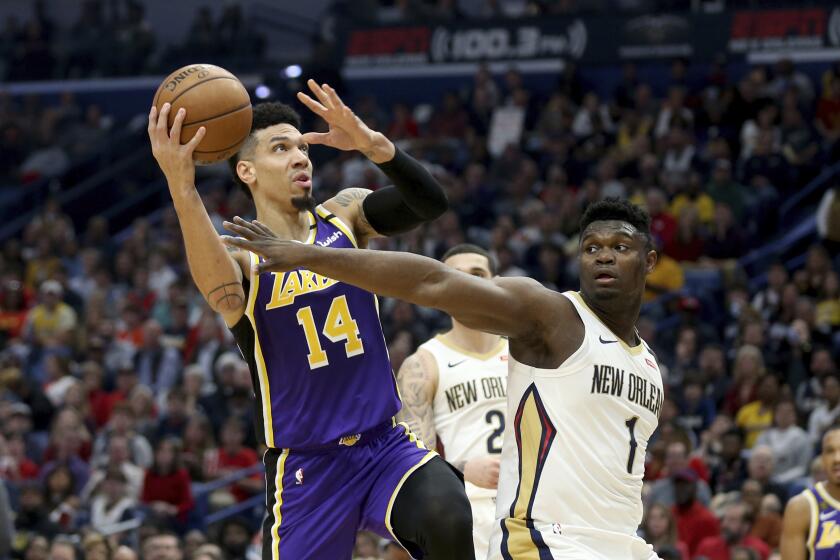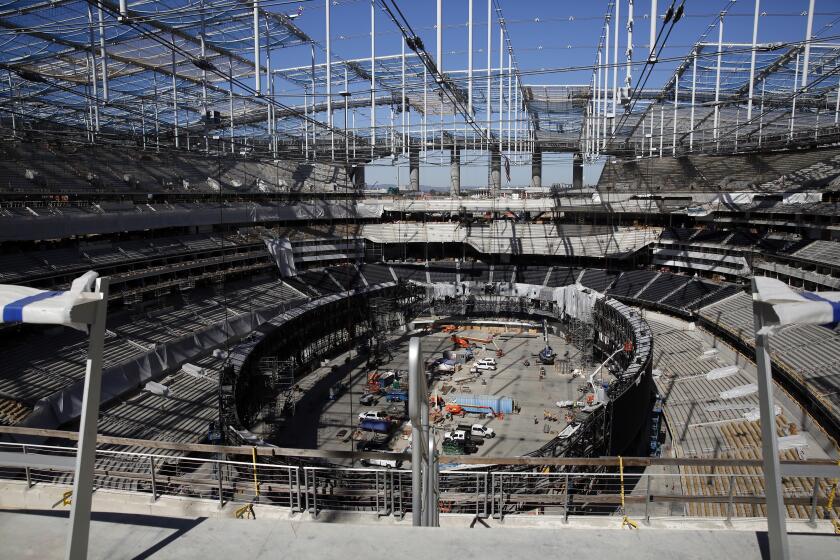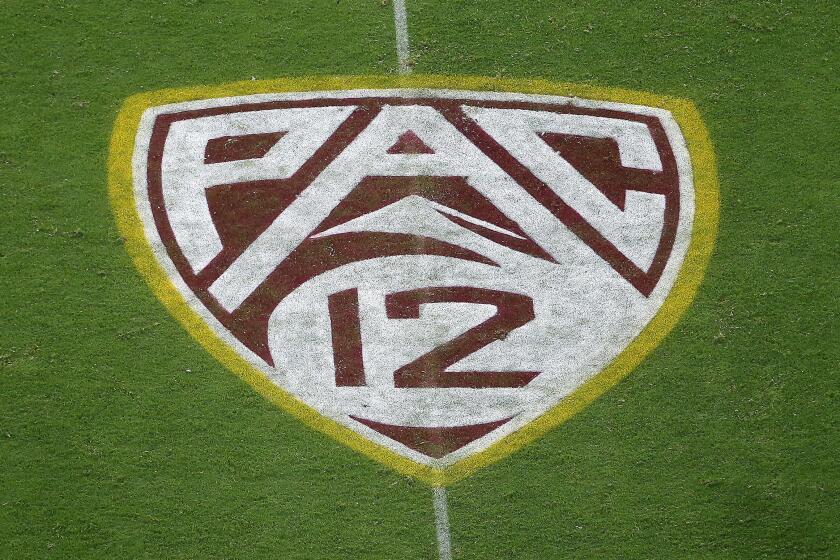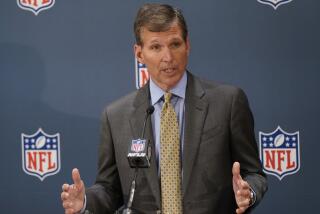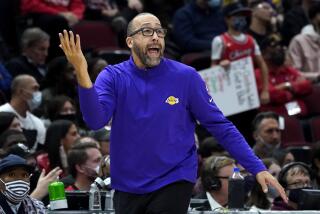Pro leagues’ return-to-play plans rely on major sacrifices and adjustments
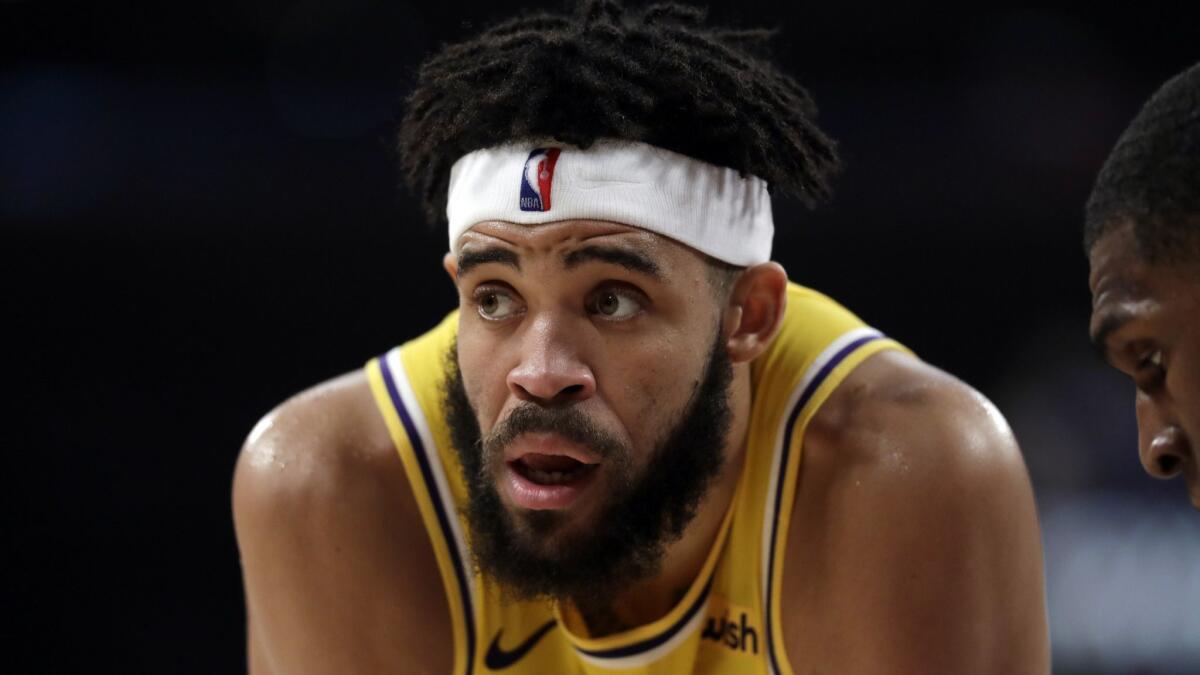
- Share via
In the second week of May, baseball believed it had a solution.
On June 2, the NHL introduced its second phase of a return.
On June 4, the NBA announced that it had agreed on a plan.
The WNBA thinks a July return is feasible.
It’s a stark contrast to nearly three months ago when the COVID-19 pandemic brought the American sports world to a halt and dramatically altered how it operated. Would they even return? Could sports ever be safe?
Now. motivated by their desire to not let a season go to waste, and surrender the money at stake, those leagues are nearing what they believe will allow them to return to play.
NFL Commissioner Roger Goodell says the league was wrong for not listening to players fighting for racial equality and encourages them to peacefully protest.
Their plans, though, rely on heavy sacrifices and dramatic adjustments from players who have already felt the strain of reduced paychecks and professional uncertainty. As in the rest of the world, leagues have had to consider public health and the safety of their players while balancing that against what one can reasonably ask a person to alter. As they move toward a solution, it’s still unclear if those two considerations can coexist. On Thursday, the same day the NBA announced its intention to resume play in Orlando, the Florida department of health announced the state’s highest number of new COVID-19 cases.
As the leagues approach a return, they are doing so at a time of nationwide unrest that personally affects many of their members. Protests against racism and police brutality that have followed the death of George Floyd, a black man who died when a white police officer knelt on his neck, have been personal for many athletes. Some have joined protests, and some have shared their own experiences with racism.
“I’m definitely seeing players responding to the time,” said Keyon Dooling, a former NBA player and mental health advocate with the players union. “I’m definitely seeing players you know being vulnerable, being impacted by the uncertainty, but also I’m seeing players being, having triggers from their life existence before basketball or even some during basketball, about some of the social injustices.”
Compounding anxiety
Dooling had already seen the stress of the season’s disruption affecting players around the league. They’d been taken out of their routines and away from the game that had often been an escape. They were also facing financial losses; their paychecks were reduced by 25% during the stoppage.
The financial aspects of MLB’s return have created a stalemate between the league and the players union.
Baseball was the first major sport to offer a plan for returning safely. The league had floated the idea of quarantining players from their families at secure spring training sites, but that caused an uproar and the league changed course.
Instead MLB produced a 67-page document that detailed a restrictive world where they can’t shower at stadiums after games, spit in their ballparks or high-five each other.
“It would probably be pretty hard to not spit on a baseball field,” Dodgers pitcher Clayton Kershaw said during a Zoom party hosted by the Dodgers. “It would be a strange one for sure.”
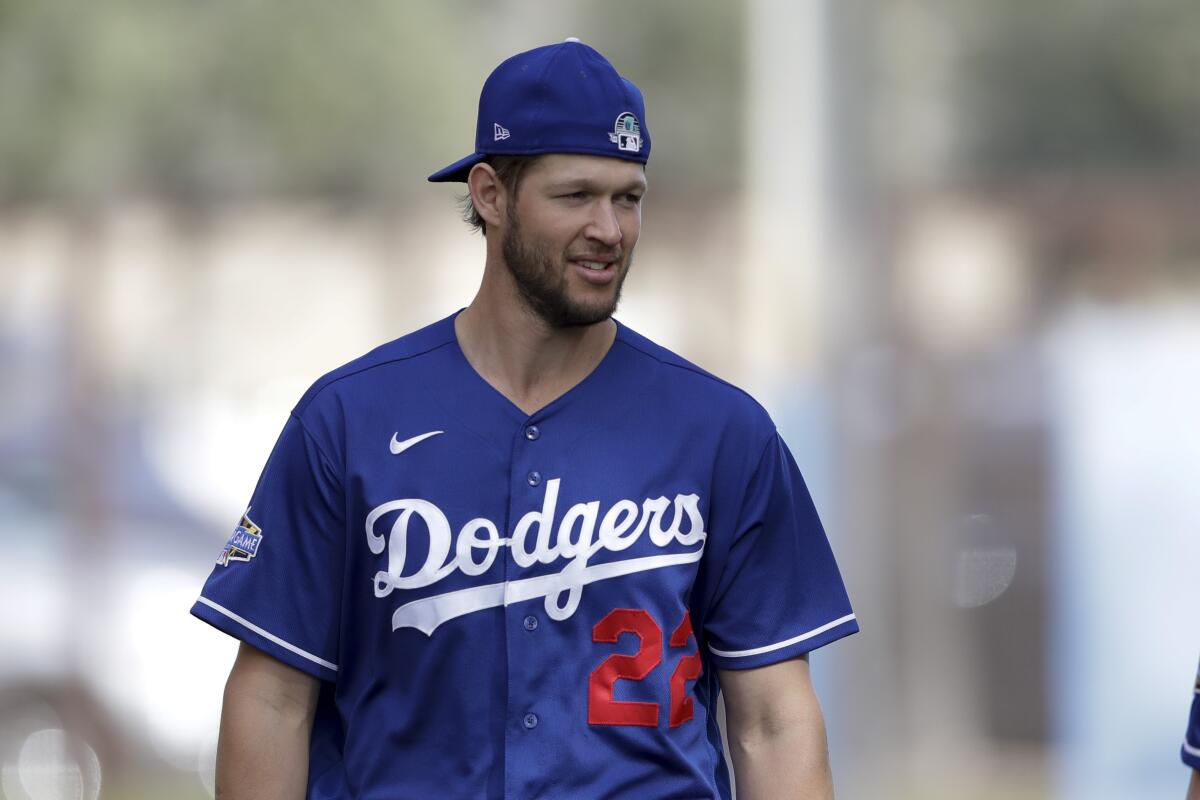
The idea of a true quarantine didn’t sit well with NBA players either.
“It was slightly concerning,” Lakers center JaVale McGee said. “Just because I don’t think people are going to do that. We’re grown men, first of all. Luckily that’s not how it’s going to be if it happens.”
The NBA Players Assn. voted unanimously in favor of the plan to return to the court and will continue negotiations with the league on a 22-team restart.
On a conference call Friday in which the players voted to approve the league’s plan to return, they reportedly were told that leaving the campus at Disney World, which would serve as the hub for the NBA, would not be an option.
It’s an issue facing NHL players as well.
“It’s going to be challenging,” former Kings forward Kyle Clifford said. “I think it’s going to be a shock to them [families] if I’m not able to see them for a pretty extended period of time.”
How players react to what’s expected of them will depend on a lot of factors, said Kate Hays, a sports psychologist based in Toronto.
“There’s just an enormous number of adaptations,” Hays said. “I think this is also a question about what their level of mental health has been, had been before the pandemic, how they’ve been able to manage this interim. What it will be like to be back?
“I would assume there will be a real increase in at least situational anxiety for just about everybody and it may be somewhat increased for people who have been dealing with some mental health issues along the way.”
Health protocols?
While the NBA knows its format for play if the season resumes July 31 as planned, it hasn’t finalized its health protocols.
“There’s constant changes in terms of what we’re learning about this virus,” Commissioner Adam Silver said during an interview Thursday on TNT. “We’re studying every day the case load in Orange County, in Florida. Whether or not antivirals or vaccines come sooner than anyone expected could impact whether fans can come.”
Silver noted that data are showing that healthy young people, like most of the league’s players, are at lower risk for severe complications. McGee, the Lakers center, has asthma and suffered from pneumonia last year, two things that could put him at greater risk if he had a COVID-19 infection. McGee said recently that he does not worry about the illness.
While McGee isn’t worried, others are. Some players are concerned about visiting older family members after exposing themselves during play.
“I would wait until it was all over, but I think that just the fact that I would be there [in Orlando] already, knowing that as soon as this is over I can go home it would make it a lot easier,” said Maurice Harkless, speaking before it was known that his Knicks would not be among the teams invited to Orlando, where he has relatives.
Harkless did not go back to see his family after the season was suspended, because he’d played against two teams, the Detroit Pistons and Utah Jazz, who had players test positive for COVID-19.
“My grandma is really old,” Harkless said. “I didn’t want to risk it not knowing, so I came here [to L.A.].”
There are also coaches in the league who are in their 60s and 70s, two age groups at greater risk. Silver said the league would protect coaches who are part of groups that are at-risk for COVID-19 complications, but that then raised questions about the rights of those coaches and their possible stigmatization.
A construction worker died after falling at SoFi Stadium in Inglewood on Friday, and work on the $5-billion project has been temporarily stopped.
The most accurate test for COVID-19 is an unpleasant experience to say the least. A large swab gets inserted into a person’s nasal cavity, all the way back to their throat, in order to collect a sample. The idea that players might have to go through such an invasive test every day is concerning to some.
“At the same time we weren’t OK with playing without fans,” the Lakers’ Danny Green said. “That was a point where we were like, ‘If we don’t have fans, no, we’re not playing, it sucks.’ But things have changed. So if we have to get tested, guess what? We have to be uncomfortable and get tested. If we gotta play without fans, we’re going to play without fans. Pretty much take anything we can get right now because of the circumstances.”
No fan support
When Lakers star LeBron James was first confronted with the idea of playing games without spectators in the stands, he hadn’t heard the NBA had been discussing it and he hadn’t been prepped for the question. His response was his gut reaction.
“I ain’t playing if you don’t have the fans in the crowd,” James said. “That’s who I play for.”
The next time James spoke about the subject, he smiled and said if that’s what was safest, that’s what he’d do.
James wasn’t alone with an averse reaction to the idea of playing without fans.
“I’m more worried about everyone else kind of hearing me as opposed to the other way around,” Dodgers pitcher Walker Buehler said during a Zoom call. “So I’m very pro fake-fan noise, just so the other dugout can’t really hear some of the things I say during games. … It’s pretty documented some of the things I yell and scream at people, but that might not work out too well for us.”
Spectators can play critical roles in the flow of a game.
“That is so much part of what the energy is about,” said Hays, the sports psychologist. “The vitality and the vibrancy. To not have spectators I think will be just very challenging and another weird thing. I expect in the grand scheme of things that probably won’t matter as much as some other issues will.”
The neutral site has also negated the advantage of home-court advantage — something the Lakers were working hard to retain as the top seed in the Western Conference.
While disappointed, some players are chalking that up to just another sacrifice in the name of saving their seasons along with giving up some freedoms.
Dr. Annabelle de St. Maurice believes universities can keep Pac-12 athletes, staff members and students safe during the coronavirus outbreak.
“Honestly I’m ready to play,” said Monique Billings, a forward for the WNBA’s Atlanta Dream who played at UCLA. “I’m a homebody, Very simplistic to myself, so honestly, it sounds OK to me, I’m not going to lie, I think I would be able to manage.”
Said Lakers forward Jared Dudley: “There’s a lot of money at stake. There’s a lot of stuff for fans. I think we owe it to fans to be able to play. I think there’s a lot of Laker fans that want to see us play.”
Staff writers Jorge Castillo, Mike DiGiovanna, Andrew Greif, Jack Harris and Thuc Nhi Nguyen contributed to this report.
More to Read
Go beyond the scoreboard
Get the latest on L.A.'s teams in the daily Sports Report newsletter.
You may occasionally receive promotional content from the Los Angeles Times.
